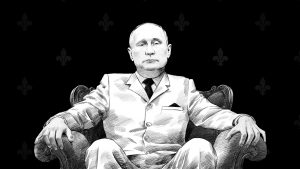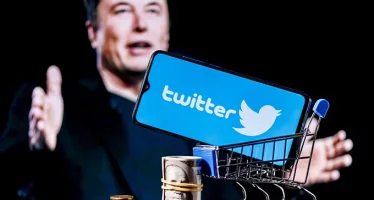The Great Dictator Becomes More and More Isolated
 Russian fat cats are, of course, no longer welcome in Europe. But now, their four-pawed relations have been declared ‘non grata’ as well. The executive board of the Luxemburg-based Fédération Internationale Féline (Charmingly abbreviated to FIFe) ruled that any cat bred in Russia or belonging to an exhibitor resident in that country may no longer partake in shows or other events sanctioned and/or organized by the federation. The board will consult with the Ukrainian Felinology Union (UFU) on ways to implement the boycott of Russian cats.
Russian fat cats are, of course, no longer welcome in Europe. But now, their four-pawed relations have been declared ‘non grata’ as well. The executive board of the Luxemburg-based Fédération Internationale Féline (Charmingly abbreviated to FIFe) ruled that any cat bred in Russia or belonging to an exhibitor resident in that country may no longer partake in shows or other events sanctioned and/or organized by the federation. The board will consult with the Ukrainian Felinology Union (UFU) on ways to implement the boycott of Russian cats.
The Russia of President Vladimir Putin is becoming more isolated by the day as outpourings of indignation reach a fever pitch over the apparently indiscriminate bombing of Ukrainian cities and towns.
In Great Britain, football fans swapped the colours of their sides for the blue-yellow of Ukraine. Facing West Ham United on Friday evening, Liverpool supporters dedicated their hallmark chant You’ll Never Walk Alone to Ukraine in a truly moving scene of mass support, solidarity, and commiseration for the embattled nation.
Groundswell
In Europe and far beyond, a groundswell of support for Ukraine grew to tsunamic size and force as Russian bombs and missiles rained down on civilians whilst an outgunned yet brave army managed to hold the line.
Summarily expelled from sports, culture, politics, and markets, Russia is being ignored by the wider world and returns the favour, its president seemingly deaf to rhyme or reason – and convinced that he has been called upon to rid the world of a dangerous Jewish Nazi subjugating a helpless people tricked and fooled into believing that they constituted an actual nation.
The delusions suffered by a grotesque botox-enhanced potentate – Charlie Chaplin would have enjoyed a field day with that absurdly long desk and the puffy little man sitting at one end – are of a scale that could, and probably should, warrant medical intervention. President Putin, however, keeps digging. And his hole is getting deeper.
Markets tumbled – yet again – on Monday thanks to a looming embargo on Russian energy exports being orchestrated by the US government in close consultation with the UK and EU. In panicky early morning trading, Brent crude promptly hit $139 – just $8 short of its July 2008 all-time peak – before settling around $128 a barrel.
Worse: prices seem unlikely to come down soon. The International Energy Agency expects global oil demand to peak later this year with supplies lagging significantly due to capital spending cuts made across the US shale sector in the wake of the pandemic-induced oil glut when the price of a barrel of crude briefly dipped below zero as storage facilities reached capacity and oil had nowhere to go.
How the world has changed in just two years. Some industry analysts now predict oil at $200 given the bullish state of most economies and the fact that US shale or Iranian oil will not suffice to plug the gap between inelastic supply and buoyant demand.
Times 20
The sheer magnitude of the energy price upswing is often lost in a multitude of numbers. Dutch front-month gas, the European benchmark, soared as futures suddenly jumped to €335 a megawatt hour ($575 a barrel of oil equivalent) – up 74% from Friday’s quote of $193. Just twelve months ago that same megawatt hour was being traded at $16.
Small wonder that stocks do not fare well. On Monday, the Stoxx 600 share index retreated 3% – accumulating losses of 10% since Russia embarked on its ill-fated invasion of Ukraine. Most markets managed to claw back some of their initial losses as the day progressed. By the close of trading, Germany’s DAX was off 1% and France’s CAC 0.8%. But markets retreated more than 20% from their recent high and thus officially entered bear territory.
For its part, the Russian rouble continued its slide, losing a further 8% and closing at 131 to the dollar in an unusually illiquid market.
Meanwhile, the Bloomberg Commodity Spot Index barrelled ahead, gaining 13% last week – the largest jump since records began in 1960.
Traders appeared riled by China’s surprisingly solid backing of Russia. Foreign Minister Wang Yi descended on the ‘wrong’ side of the fence and vigorously defended his country’s “everlasting friendship” with its neighbour to the north and condemned the US for trying to create an “Indo-Pacific version of NATO.” Mr Yi also said that China and Russia oppose attempts to revive the “cold war mindset”.
The parallel reality in which the thought processes of Messrs Yi and Putin – and their associates and supporters – come to fruition is truly frightening given that it results in doublespeak whereby verifiable truths are readily denied for a higher but ill-defined national purpose. Russians questioning the Kremlin narrative now risk fifteen years in prison for spreading ‘false information’ such as calling the war in Ukraine by its proper name instead of the officially sanctioned term ‘special military operation’.
Otherwise known as propaganda, the phenomenon is not so much new as it is being applied with an almost unhear-of level of cynicism as exemplified by Mr Yi and his supposed opposition to the exact cold war mindset that prompted President Putin to re-establish the borders of that bygone era.
Totalitarian Russia has outdone China but without a functioning economy, access to foreign goods and services, and the ability to travel. Flag carrier Aeroflot has been forced to scrap its global network and no longer serves international destinations except for Minsk in next-door Belarus which, arguably, ceased to exist as a sovereign country.
An iron curtain has once again been drawn around Russia. The country is being shunned and confined in the cage it had left but some thirty years ago. Only, it’s a much smaller case, one without European satellite states and without large swaths of Asian desert.
You may have an interest in also reading…
Whilst Trade Talks Falter, Brits Celebrate Vaccine First
Mind the paradox. Thanks to EU law, the UK has become the first country to certify for clinical use the
Many a Titter about Twitter as Musk Bungles his Big Purchase
Dust off your shovels! Elon Musk has bought himself into a $44bn hole, and you’re expected to dig him out
Avatar Influencers are Storming Up the Earnings Charts — and Creators Stand to Make Some Healthy Profits
Virtual and AI personas have the highest earning potential for single Instagram posts… Digital personas created via AI or software


















































































